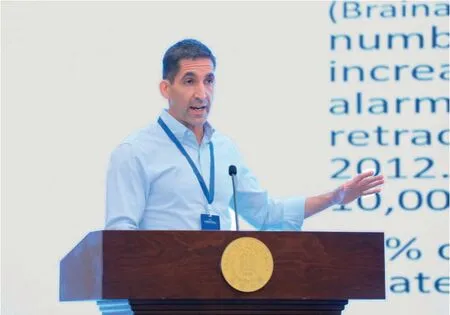China takes’ massive steps’ in wildlife conservation, says foreign expert
By Zhu Bochen

James Edward Ayala (The United States)Master of Conservation Biology, Winner of the Fourth Chengdu Jinsha Friendship Award in 2020
Recently a foreign expert at Chengdu Research Base of Giant Panda Breeding lauded the progress China has made in protecting wildlife and forging international relationships around those efforts.
“China has taken massive steps to conserve wildlife, and the creation of the giant panda national park is one of those steps,” said James Edward Ayala, a U.S. research specialist at the base. “I think at the scale that China is working, it’s shocking how quickly things can get done,” he added.
In July this year, China’s Ministry of Ecology and Environment announced that the status of wild giant pandas in the country had been downgraded from “endangered” to “vulnerable”.
“That’s directly because of the action the government is taking to create these nature reserves and national parks,” Ayala Said.
Having received a degree in animal behavior studies, Ayala has more than 20 years of experience working with wild animals. He has devoted much of his career to the research and conservation of giant pandas and has spent the past 11 years working for the base in southwest China’s Chengdu city.
Speaking about his working and living experience in Chengdu, Ayala said that the panda base is like a family to him and all his colleagues are very supportive.
“This makes staying in China so much easier,” he said.
Still, Ayala believes that the approaches China and Western countries take to wildlife conservation differ both academically and technically. According to him, China has done a great job of utilizing technology and there are a lot of papers addressing natural and physical sciences such as endocrinology, but not as many in the fields of psychology, animal cognition and animal behavior.
“That’s also why I think it’s important that we have these collaborations, so we can bring in talents like myself that focus on the behavior side,” he said.
As the 15th meeting of the Conference of the Parties to the UN Convention on Biological Diversity (COP15) kicked off on Oct.ll in Kunming, capital of southwest China’s Yunnan province, Ayala reaffirmed the significance of global cooperation in tackling environmental and biodiversity issues.
“I do think that regardless of politics, environmental conservation should be the imperative of all countries” Ayala said. “While there’s so much instability in the world politically, hopefully, the environment can allow us to focus on getting together.”
Ayala explained that the conservation of the giant panda has always been an international effort. “Panda conservation is just a small part of the environment conservation, but it just shows that it is possible to work as a group internationally,” he added.

